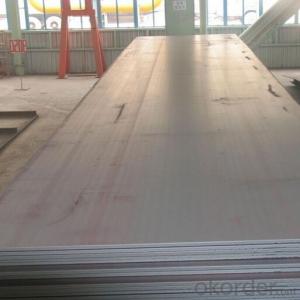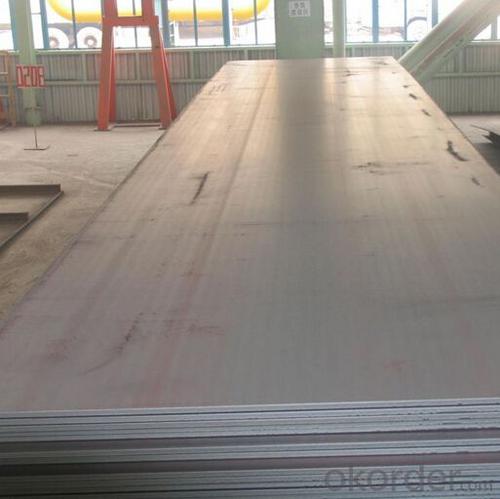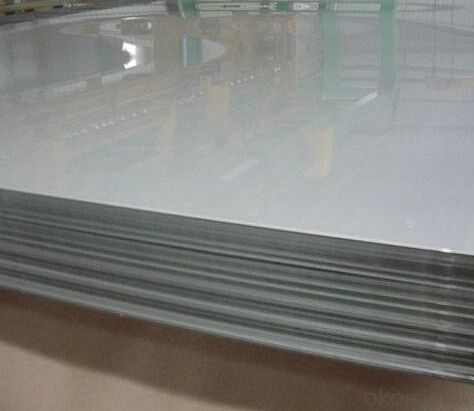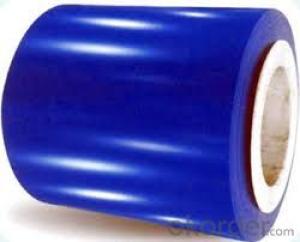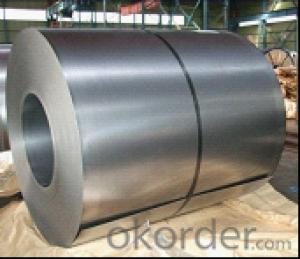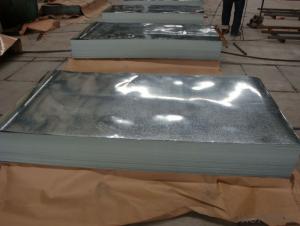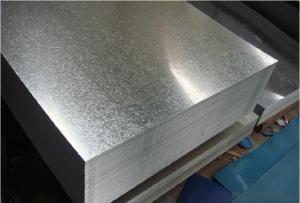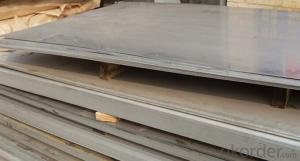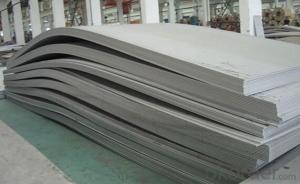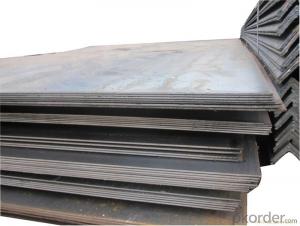Carbon Iron Sheet Hot Rolled Steel Plates S275JR High Strength
- Loading Port:
- Tianjin
- Payment Terms:
- TT OR LC
- Min Order Qty:
- 50 m.t.
- Supply Capability:
- 50000 m.t./month
OKorder Service Pledge
OKorder Financial Service
You Might Also Like
Specification
1.Description of steel sheet:
Stainless steel types 304 and 304L.Type 304 stainless steel material is a kind of common stainless steel materials, corrosion prevention is b
2.Features of steel sheet:
304 stainless steel has good corrosion and corrosion resistance and good resistance to intergranular corrosion. For oxidizing acid, obtained in the experiment, the concentration of 65% or less under the boiling temperature of nitric acid, 304stainless steel has a strong corrosion resistance. To most organic and inorganic acid and alkali solution with good corrosion resistance ability.
All stainless stock can be delivered mirror polished if required
3.Data of steel sheet:
| Thickness(mm) | Width(mm) | Length(mm) | |
| Cold Rolled Plates | 0.5-2.0 | 1000 1250 | 2000 2500/Random Length |
| Hot Selling Sizes | (4-8)mm*1500*3000/6000mm; (12-20)mm*1500mm*6000mm; | ||
| Other Common Size | 1219*2438; 1220*2440; 1500*3000; 1500*6000; 2438*6096; 2438*9143 | ||
| Application | Widely used for making rebar or building house rack od the workshop; bridge; vehicle;boiler; container; vessels; machine part; etc. | ||
Chemical Composition | |||
| Q235A | C:0.14~0.22%; Mn:0.30~0.65; Si≤0.30; S≤0.050; P≤0.045 | ||
| Q235B(Hot Selling) | C:0.12~0.20%; Mn:0.30~0.670; Si≤0.30; S≤0.045; P≤0.045 | ||
| Q235C | C≤0.18%; Mn:0.35~0.80; Si≤0.30; S≤0.040; P≤0.040 | ||
| Q235D | C≤0.17%; Mn:0.35~0.80; Si≤0.35; S≤0.040; P≤0.035 | ||
4.Image of steel sheet:
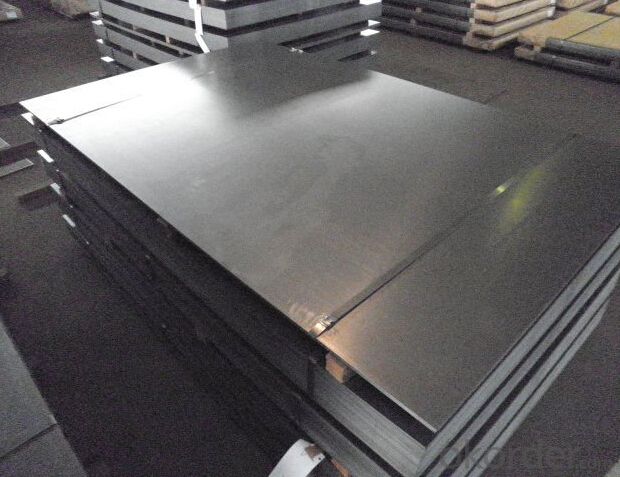
5.FAQ
We have organized several common questions for our clients,may help you sincerely:
①How about your Warranty?
Warranty: 1-Year for the whole light. Warranty is based on correct storage, installation, using and maintenanc
②How to guarantee the quality of the products?
We have established the international advanced quality management system,every link from raw material to final product we have strict quality test;We resolutely put an end to unqualified products flowing into the market. At the same time, we will provide necessary follow-up service assurance.
③How long can we receive the product after purchase?
In the purchase of product within three working days, We will arrange the factory delivery as soon as possible. The pecific time of receiving is related to the state and position of customers.Commonly 7 to 10 working days can be served.
- Q: What safety precautions should be taken when handling steel sheets?
- When handling steel sheets, it is important to take several safety precautions. Firstly, workers should always wear appropriate personal protective equipment (PPE) such as gloves, safety glasses, and steel-toe boots to protect themselves from potential injuries. Secondly, workers should be trained on proper lifting techniques to avoid strains and back injuries. It is also crucial to ensure that steel sheets are stacked and stored securely to prevent them from falling and causing accidents. Additionally, workers should be cautious of sharp edges and corners on the steel sheets and use appropriate handling tools or equipment, such as clamps or lifters, to minimize the risk of cuts or injuries. Regular inspections of the steel sheets and the work area should be conducted to identify and address any potential hazards promptly.
- Q: What are the common applications of stainless steel sheets?
- Stainless steel sheets have various common applications across different industries. They are commonly used in construction for roofing, cladding, and decorative purposes. In the automotive industry, stainless steel sheets are used for making exhaust systems, body panels, and trim. They are also utilized in the manufacturing of kitchen appliances, such as sinks, countertops, and cookware, due to their resistance to corrosion and easy maintenance. Additionally, stainless steel sheets find applications in the pharmaceutical industry, where they are used for medical equipment, storage tanks, and sterile environments.
- Q: Can steel sheets be used for water tanks or storage containers?
- Yes, steel sheets can be used for water tanks or storage containers. Steel is a durable and strong material that can withstand the pressure and weight of holding water or storing various materials. It is commonly used in the construction of water tanks and storage containers due to its resistance to corrosion, ability to maintain structural integrity, and ease of maintenance. Steel sheets can be fabricated into different shapes and sizes to meet specific requirements, making them versatile for various applications. Additionally, steel is a recyclable material, which adds to its sustainability and environmental benefits.
- Q: What are the different methods of surface cleaning for steel sheets?
- Surface cleaning of steel sheets offers various methods, each with its own advantages and applications. 1. Mechanical Cleaning: To physically eliminate dirt, rust, and other contaminants from steel sheet surfaces, one can utilize sandpaper, wire brushes, or abrasive blasting. This approach is ideal for heavy-duty cleaning and preparing surfaces for further treatment or coating. 2. Chemical Cleaning: By employing chemicals or detergents, one can dissolve or remove contaminants from the steel surface. This method is particularly effective in eliminating grease, oil, and other organic substances. It is crucial to select the appropriate chemical cleaner based on the type of contamination and the composition of the steel sheet, ensuring effective cleaning without surface damage. 3. Electrolytic Cleaning: This technique involves submerging the steel sheet in an electrolyte bath along with an electric current to dissolve and separate contaminants. Electrolytic cleaning is effective in removing stubborn rust, scale, and oxidation, while also providing a polished finish. 4. Power Washing: Also known as pressure washing, this method employs a high-pressure water stream to cleanse the steel surface. Power washing effectively removes loose debris, dirt, and mild contaminants. However, it may not be suitable for heavy-duty cleaning or the elimination of stubborn substances like rust. 5. Vapor Degreasing: Vapor degreasing utilizes solvent vapors to clean the steel surface. By exposing the steel sheet to these vapors, contaminants are dissolved and removed. This technique is particularly effective in eliminating oil, grease, and other organic substances. Vapor degreasing is a precise and controlled cleaning method commonly utilized in industrial applications. Before selecting a surface cleaning method, it is crucial to consider the type and severity of contamination, the desired level of cleaning, and the specific requirements of the steel sheets. Additionally, it is important to prioritize safety precautions and utilize appropriate protective equipment when performing any surface cleaning procedure.
- Q: Can the steel sheets be painted or coated?
- Yes, steel sheets can be painted or coated. Painting or coating steel sheets is a common practice in various industries to enhance the appearance, protect against corrosion, and improve durability. The steel surface should be properly cleaned and prepared before applying any paint or coating to ensure proper adhesion. Different types of paints or coatings can be used depending on the desired finish, environmental conditions, and the specific application. It is important to select the appropriate type of paint or coating that is compatible with the steel substrate and can withstand the intended use and exposure to chemicals, moisture, UV radiation, or other factors that may affect the performance and longevity of the coating.
- Q: What are the safety precautions for handling steel sheets?
- When handling steel sheets, it is important to follow several safety precautions. Firstly, workers should wear appropriate personal protective equipment (PPE) such as gloves, safety glasses, and steel-toed boots to protect themselves from potential injuries or hazards. Additionally, workers should be trained on proper lifting techniques to prevent strains or muscle injuries. It is crucial to use mechanical lifting equipment like cranes or forklifts when moving heavy steel sheets to avoid manual handling risks. Furthermore, the storage area should be organized and secured to prevent falling objects and injuries. Regular inspections of the sheets for defects or sharp edges are necessary to prevent cuts or punctures. Lastly, workers should be aware of the proper procedures for cutting or shaping steel sheets, using tools that are well-maintained and in good working condition. Adhering to these safety precautions will help minimize the risk of accidents and ensure a safe working environment.
- Q: How thick are steel sheets typically?
- Steel sheets can vary in thickness depending on their intended use, but they are typically available in thicknesses ranging from 0.5mm to 6mm for general applications.
- Q: What is the weight of steel sheets?
- The weight of steel sheets can vary depending on the thickness and dimensions of the sheet. Generally, steel sheets can range from a few pounds to several hundred pounds per square foot.
- Q: Are the steel sheets susceptible to rusting?
- Certainly, steel sheets can be prone to rusting. Rust forms due to the chemical reaction involving iron, oxygen, and moisture. Given that steel is mostly composed of iron, it can readily corrode upon contact with air and water. Nevertheless, the degree of rusting varies based on factors like the steel type, environmental circumstances, and the availability of protective coatings. To thwart rusting, people frequently apply substances such as zinc or paint onto steel sheets to establish a barrier between the steel surface and its surroundings. Additionally, taking regular care and storing the sheets properly can significantly reduce the likelihood of rust formation.
- Q: Are steel sheets resistant to termite infestation?
- Steel sheets do not possess resistance against termite infestation. Although termites primarily consume wood and other cellulose-based materials, they can indirectly harm steel structures. Termites are capable of tunneling through various substances like concrete or insulation in order to access the wooden parts of a construction. Consequently, even though termites may not directly affect the steel sheets themselves, they can still jeopardize the overall stability of a building or structure if they manage to infiltrate the wooden components. Hence, it is crucial to implement preventative measures, conduct regular inspections, and apply treatments to vulnerable areas to safeguard against termite infestation, regardless of the presence of steel sheets.
Send your message to us
Carbon Iron Sheet Hot Rolled Steel Plates S275JR High Strength
- Loading Port:
- Tianjin
- Payment Terms:
- TT OR LC
- Min Order Qty:
- 50 m.t.
- Supply Capability:
- 50000 m.t./month
OKorder Service Pledge
OKorder Financial Service
Similar products
Hot products
Hot Searches
Related keywords
